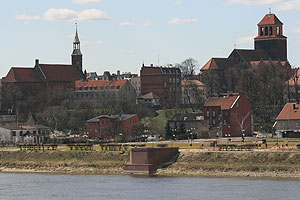Tczew - POLAND
 Facts and figures about Tczew
Facts and figures about Tczew
The city of Tczew inhabited by over 60 thousand people, is the fourth largest city of the Pomerania region, after Gdansk, Gdynia and Slupsk. The city of Tczew is the most important hub of railway commuter traffic in Northern Poland, linking all railway connections coming from all parts of the country with the Gdansk agglomeration. The city has also a very compact character, expressed in very high density of population (over 2,700 inhabitants per km2) and the built-up area. The most distant points of the residential network are not located more than 5 km from one another and no point of the city is located more than 3.5 km from the railway station. The location of Tczew inspired the city promotion officers to adopt a logo claiming that “From Tczew - it is close to anywhere”.
In 2010 the city is going to celebrate its 750th anniversary, and a rich programme of various outdoor and indoor cultural events is planned within the framework of the celebrations. In mid May 2010 a conference about cycling tourism is going to be held together with the Annual General Meeting of the European Cyclists’ Federation.
Tczew has only 2% modal share for cycling and is a "STARTER"city.
Local activities in Tczew
The city of Tczew's motto within PRESTO is “Cycling Across Generations”. Local activities include the following four actions:
1. Bicycle lane network. The development of a bicycle lane network will be preceded with a creation of an online database about places where barriers to cycling exist. City planners will be given a list of easily applicable traffic solutions, such as places where linear barriers to cycling create difficulties for cyclists and which can be easily removed to facilitate cycling.
2. Multigenerational cycling promotion. This action aims at encouraging grandparents and parents to travel by bicycle to school with their (grand-)children. It will result in a reduction of car use for escorting children to schools, reducing congestion and parking problems near school buildings. These action are based on the bikeability campaign carried out in the United Kingdom. The campaign will be carried out with the help of Senior Citizens Club, using advertisements, training sessions, leaflets, painting/ photography contests, etc.
3. Demonstration of electric bicycles within the European Mobility Week. Activities which promote electric bikes are intended to change the perception and image of bikes. They will show, that owning a bike and using it does not mean at all lower social or material status. The change in perception is very important for many young people, who tend to think that owning a car advances their social status.
4. Electric bicycles for professional use. Activities carried out in Tczew are intended to promote electric bikes as an alternative mode of transport for daily commuting. The aim of the campaign is to persuade the largest possible group of people to test electric bikes on their own. A similar campaign has been carried out in Holland – in the city of Rotterdam.
.: NEWS :.
20/08/2012
PRESTO presents its latest tool: the pedelecs brochure
08/02/2012
The Lessons Learnt brochure is now available in 6 languages
27/01/2012
ETRA launches dealer survey on electric bicycles

